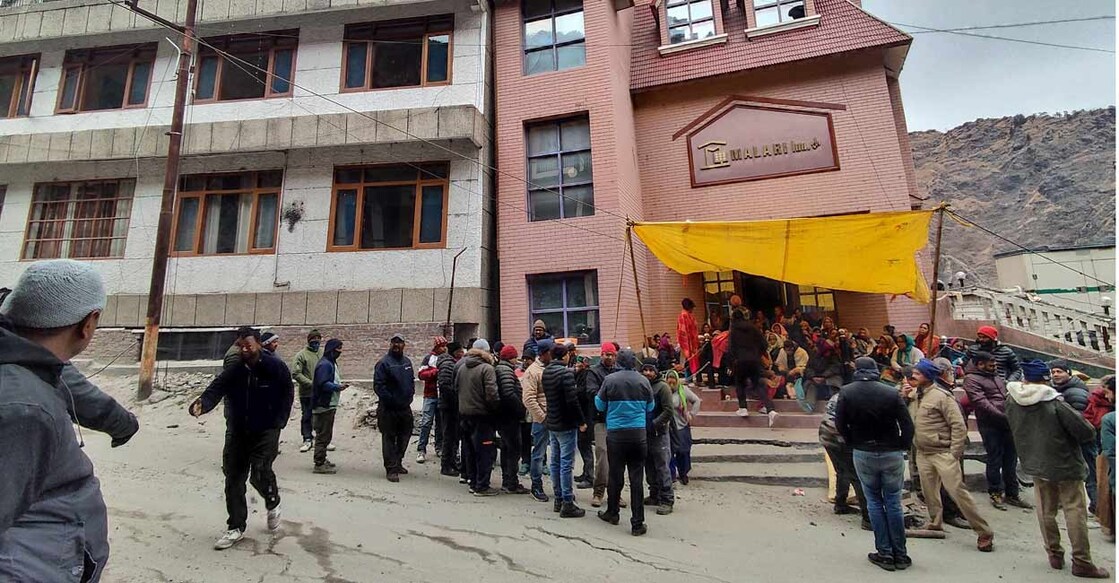Joshimath: Govt-run bodies told not to talk to media, ISRO images on land subsidence 'withdrawn'

Mail This Article
Joshimath: Several state-run institutions including ISRO have been directed by the National Disaster Management Authority (NDMA) and the Uttarakhand government not to interact with media or share information on social media on the Joshimath situation without prior approval.
The direction came after satellite images released by the Indian Space Research Organisation showed the rapid rate of subsidence in Joshimath between Dec 27 and January 8, fuelling concerns over the situation, even as Uttarkhand Minister Dhan Singh Rawat said on Saturday that the ISRO images have been withdrawn.
Rawat said ISRO has not issued an official statement on the basis of the images.
"I had seen the satellite images of Joshimath on ISRO's website. I spoke to ISRO's Director and asked him why he is not issuing an official statement in this regard. Now I am told the images have been withdrawn," he told reporters.
"Things are returning to normal in Joshimath. No one needs to panic," the minister, who visited Joshimath to take stock of the situation there, said.
In its communication to the heads of organisations and institutes on Friday, the NDMA said it has observed that various government institutions are releasing data related to the subject on social media platforms and also they are interacting with the media with their own interpretation of the situation.
The statements on Joshimath are creating confusion not only among affected residents but also among citizens of the country, the NDMA said.
It said people associated with them should not interact with the media and share data on social media regarding the ground subsidence in Joshimath.

The NDMA asked the organisations to sensitise its experts about the matter and added they should refrain from posting anything on media platforms until the final report of the expert group is released by the NDMA.
In a similar communication, the Uttarakhand government conveyed to the organisations that some of the institutions and agencies are publishing and uploading information or reports about Joshimath without taking due permission from competent authorities which is adversely impacting the ground situation as well as triggering panic among the community.
The media is also propagating this blatantly, it said.
The communication said the organisations, before publishing or uploading any such reports or information, should obtain prior approval either from the respective central ministries or the Uttarakhand State Disaster Management Authority.
The Congress slammed the alleged gag order.
"Instead of solving the crisis and finding solutions to the problems of people, Government agencies are putting a ban on ISRO report and stopping its officials from interacting with the media. Narendra Modi ji, 'Do Not Shoot the Messenger'," Congress president Mallikarjun Kharge tweeted.
AICC general secretary Jairam Ramesh said, "They make one Constitutional institution attack another. Now, National Disaster Management Authority tells ISRO to shut up."
Official sources said the purpose of the advisory is not to deny information to the media but to avoid confusion because so many institutions are involved in the process and they are giving their own interpretation of the situation.
Concerns rose on Friday when ISRO released satellite images of Joshimath showing that the Himalayan town sank at a rapid pace of 5.4 cm in just 12 days, triggered by a possible subsidence event on January 2.

The preliminary study shared by ISRO's National Remote Sensing Centre (NRSC) on its website said the land subsidence was slow between April and November 2022, during which Joshimath had sunk by 8.9 cm.
The images are now not available on the website.
The NDMA and state government communications have been sent to Central Building Research Institute (CBRI), Roorkee, Geological Survey of India (GSI), National Remote Sensing Centre (NRSC) of the ISRO, Hyderabad, Central Ground Water Board (CGWB), New Delhi, Surveyor General of India, Dehradun and Indian Institute of Remote Sensing, Dehradun.
It has also been sent to the National Geophysical Research Institute, Hyderabad, National Institute of Hydrology, Roorkee, Wadia Institute of Himalayan Geology, Dehradun, Indian Institute of Technology, Roorkee, National Institute of Disaster Management, New Delhi, and Uttarakhand State Disaster Management Authority.

